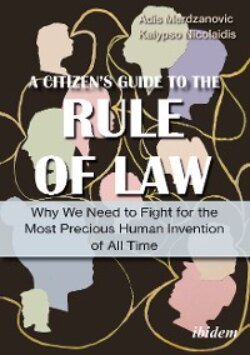Читать книгу A Citizen’s Guide to the Rule of Law - Kalypso Nicolaidis - Страница 18
Fighting emperor Palpatine
ОглавлениеLiberalism is a big term, but actually a quite simple idea: it states that the legitimacy of any social or political order rests with the individual. It all starts with each and every one of us. By virtue of being human, each one of us is endowed with a set of rights starting with the right to live and take our own fate into our own hands.
Of course, this creates problems. If we have a disagreement and I decide to take matters into my own hands, you might not like it. So, all of us together, therefore decide to delegate certain of our rights to a political authority, and so the state is formed.
We task the state with regulating certain areas of our daily lives, mostly guaranteeing our security. Yet there are certain rights we cannot cede—the US Declaration of Independence calls them “unalienable rights” and specifically mentions “life, liberty, and the pursuit of happiness”. Others might want to add “property” in this mix, but the larger point stands: there are guaranteed rights and liberties that cannot be delegated to a state and no one has the authority infringe upon them.
But how can we ensure far-reaching rights for everybody in a society with more than one individual? Some compromise is needed. Liberals believe that the best form of government ensures that you have to give up as few liberties as necessary to secure social order and security. John Stuart Mill, the famous British philosopher, once argued that “the only purpose for which power can be rightfully exercised over any member of a civilized community against his will, is to prevent harm to others”.11
We may think of it this way: My neighbour’s right to swing his fist ends where my face begins. Here, the state can intervene and limit my neighbour’s rights. But as John Locke—another of those British philosophers that have spent a lot of time thinking about such questions—reminds us, should the state exert its power too far and breach Mill’s “no harm principle”, resistance against the state becomes legitimate.12 So, we, the citizen, always retain the final authority over the system.
Seems like a sweet deal, doesn’t it? Something one could easily rally around, no?
Today, certainly. But this was actually quite a revolutionary thought when Locke first made it. Kings were still ruling much of the world—and they weren’t just monarchs without any real powers, like Queen Elizabeth II is today. They were true autocratic rulers of their dominions, like Emperor Palpatine from Star Wars. Their supreme rights, status, and privileges were beyond questioning, as their authority came directly from God. Or at least that’s what they wanted everybody to believe.
So, here came the Liberals who said: “Well, actually, God (or nature) gave us some rights, too. You are only king if we agree to your authority. And even then, we still have some rights you are not to touch. Otherwise, we can get rid of you!” This must have seemed a preposterous suggestion to kings, queens and emperors alike. While they could not stem the tide of liberalism entirely, they certainly sought to minimise the damage to their absolute authority. Even in England where the Magna Carta—one of the first codifications of a proto-system for the rule of law—was drafted in the 12th century to protect individual liberty, this concerned the rights of the barons rather than ordinary people.
Unsurprisingly, the simple idea of protecting individual rights and freedoms formed the cornerstone not only of the French and American Revolutions, but also of all contemporary fundamental human rights treatises and constitutional orders in Western polities, including the EU. Except that by then, such rights were not to be limited to the barons of the day.
So, that’s the “liberal” part of “liberal democracy”. But what about “democracy”? Doesn’t democracy mean “the rule of the people”? Yes, indeed it does. So, how does that square with the rights of individuals we have been talking about so far?
